I’m no fan of snow.
Growing up in southwest Texas, where we considered Christmas Days with temperatures in the sixties “cold,” I used to wish fervently for snow. But now that I must trudge through, drive over, and shovel away anywhere from several inches to several feet of the white stuff each winter, I’ve found that snow has lost its novelty. And when I fell in a snow drift that masked a drainage ditch a few years back and broke my leg (the surgeons used the word “shattered,” in fact), I’ve even sometimes considered snow to be my nemesis.
For this reason, if for no other, I instantly appreciated this year’s Doctor Who Christmas special. Snow is the villain of the piece!
Of course, this being Doctor Who, the snow isn’t really snow: it’s a “multi-nucleate crystalline organism with the ability to mimic and mirror what it finds.” (Trying saying that three times fast! Matt Smith probably could!) These “snowflakes” are the remarkably versatile extensions and manifestations of a mysterious “Great Intelligence” (perhaps a recurring threat in the remainder of series seven?), manipulating the misanthropic Dr. Simeon in its diabolical quest to make an eternal winter descend upon humanity—transforming the earth’s populace into a race of snow people in the process.
“The Snowmen” departs from the Yuletide template current show runner and head writer Steven Moffat established with “A Christmas Carol” (2010) and developed further in “The Doctor, the Widow, and the Wardrobe” (2011). Those two episodes focused on the beautiful, romantic aspects of the season, and were replete with properly iconic “Christmas-y” moments: Cyril’s secret trip downstairs to peek at the presents beneath the tree, for example, or the “congregational” candle-lit singing of “Silent Night.” Granted, these moments had a science fictional or fantastic twist—Cyril’s prematurely opened package led him to another world, and those “Silent Night” singers were the passengers and crew of a seemingly doomed space-liner—but even so, they paid homage to trappings and traditions that, for many people, “make Christmas Christmas.”
With “The Snowmen,” however, Moffat moves back to the pattern established by Russell T. Davies in subverting traditional Christmas imagery. As “The Christmas Invasion” (2005) gave us lethal robotic Santas and twirling trees that spun off ornaments with ninja-like accuracy, “The Snowmen” gives us snarling snowmen—a far cry from friendly Frosty! I chuckled a lot at seeing snow unmasked as the menace it really is (and a menace mellifluously voiced by Sir Ian “Gandalf/Magneto” McKellan, to boot!).
In the Bleak Midwinter…
My personal snow phobia aside, Moffat’s choice of snow as the “monster of the week” establishes the script’s larger association of cold and freezing conditions with evil and inhumanity.
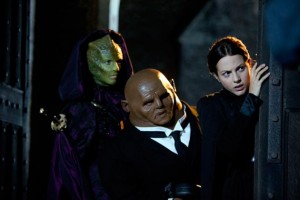 Not “inhumanity” in the simple sense of anything non-homo sapiens, mind you. Two of this episode’s heroes and most compelling characters, after all, are the Silurian “Veiled Detective” Madame Vastra (cleverly suggested here to be Conan Doyle’s real inspiration for Sherlock Holmes, in one of two “wink-and-nods” to Moffat’s other current BBC success) and the blustering but big-hearted Sontaran nurse, Strax (“Do not attempt to escape or you will be obliterated! May I take your coat?”), both making encore appearances from “A Good Man Goes to War” (6.7).
Not “inhumanity” in the simple sense of anything non-homo sapiens, mind you. Two of this episode’s heroes and most compelling characters, after all, are the Silurian “Veiled Detective” Madame Vastra (cleverly suggested here to be Conan Doyle’s real inspiration for Sherlock Holmes, in one of two “wink-and-nods” to Moffat’s other current BBC success) and the blustering but big-hearted Sontaran nurse, Strax (“Do not attempt to escape or you will be obliterated! May I take your coat?”), both making encore appearances from “A Good Man Goes to War” (6.7).
No, “The Snowmen” highlights inhumanity in the sense of people who are less than fully human. It takes to a whole new level what seems to be Moffat’s preoccupation with “frozen people” in his holiday Who tales. “A Christmas Carol” revolved around Abigail Pettigrew, placed in a personal freezer unit against her will to stave off inevitable death. “The Doctor, the Widow and the Wardrobe” didn’t feature any literally frozen people, but perhaps its petrified tree-people can be understood as “frozen” after a fashion.
In “The Snowmen,” however, frozen people abound. The story’s bleak midwinter setting reflects the bleakness of several of its principal players. We have the dead governess, emerging from the bottom of the frozen pond as a (fairly visually impressive) reconstituted ice-woman, but other characters are “frozen,” too. Captain Latimer is emotionally frozen, unable either to connect with his children (“It’s not really my area”) or to express his attraction to Clara (“You have, if I may say, a remarkable amount of wisdom in these matters, for one so very pretty… Young, I mean”). Latimer’s character arc suggests that of Archibald Craven in The Secret Garden, and would have benefitted from more time for on-screen development; but Moffat is more concerned with two other “frozen people.”
Shivering Simeon
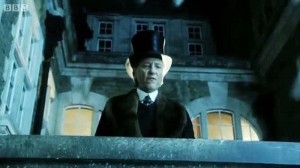 Dr. Simeon is “frozen” from childhood in isolation and misanthropy, and the Great Intelligence’s reflection of these attributes nearly leads to a frozen world in which everyone becomes, literally, what Simeon already is, metaphorically—in the Doctor’s words, “the ultimate fusion of snow and humanity… living ice that will never melt.” Simeon resembles Kazran Sardick (and, of course, Sardick’s literary model, Ebenezer Scrooge): he is completely cut off from his fellow human beings, devoid of sympathy or compassion. Sardick and Scrooge availed themselves of the opportunity to find redemption. Simeon does not.
Dr. Simeon is “frozen” from childhood in isolation and misanthropy, and the Great Intelligence’s reflection of these attributes nearly leads to a frozen world in which everyone becomes, literally, what Simeon already is, metaphorically—in the Doctor’s words, “the ultimate fusion of snow and humanity… living ice that will never melt.” Simeon resembles Kazran Sardick (and, of course, Sardick’s literary model, Ebenezer Scrooge): he is completely cut off from his fellow human beings, devoid of sympathy or compassion. Sardick and Scrooge availed themselves of the opportunity to find redemption. Simeon does not.
Given the character’s name, heard in a Christmas setting, I couldn’t help but wonder whether Moffat intended any allusion to the Simeon of Luke 2. I’m unconvinced he did: the biblical Simeon, after all, was “righteous and devout, looking forward to the consolation of Israel” (2.25); he was no misanthrope. The only parallel I could draw was the fact that both Luke’s Simeon and Moffat’s are expecting a new world—indeed, have been waiting their whole lives for it—but while Luke’s Simeon ultimately does see, in the infant Jesus, the salvation of the world and can thus die in peace (2.29-32), Moffat’s Simeon dies in pain and oblivion, never having seen the world for which he waited and worked come to pass—fortunately for humanity!
An Unkind Doctor, a Kind Companion
The other “frozen person” in Moffat’s script is the Doctor himself. Although Amy Pond is never mentioned by name (not quite—late, lamented Amelia is clearly the significance behind Clara’s final response in Madame Vastra’s one-word test), she is a presence by her absence. (As we watched, my wife pointed out that the Doctor was wearing Amy’s glasses as he read—a nice carry-over from “The Daleks Take Manhattan” [7.5] that my wife had predicted back in the fall—good call, sweetie!) I’m unsure how long the Doctor has, in his grief at the loss of Amy (and, surely, Rory too), been hiding himself on a cloud in the Victorian Era; but it’s clearly been a long time, long enough that Madame Vastra can describe the Doctor’s physical and emotional distance as the current norm: “The Doctor is not kind… He was different once, a long time ago. Kind, yes. A hero, even. A saver of worlds. But he suffered losses which hurt him. Now he prefers isolation to the possibility of pain’s return.”
The Doctor is frozen—and it will take a new companion to thaw him.
 Jenna-Louise Coleman will play that new companion. She doesn’t in this episode—does she? The three women we see in this episode who share a face and some variation on the name “Clara Oswin Oswald”—Victorian Clara; futuristic “soufflé girl” and unknowingly “Dalek-ized” Oswin (in flashback from “Asylum of the Daleks” [7.1]); and the presumably present-day character in the special’s “tag scene” who doesn’t believe in ghosts—seem to be three distinct people, although obviously somehow connected.
Jenna-Louise Coleman will play that new companion. She doesn’t in this episode—does she? The three women we see in this episode who share a face and some variation on the name “Clara Oswin Oswald”—Victorian Clara; futuristic “soufflé girl” and unknowingly “Dalek-ized” Oswin (in flashback from “Asylum of the Daleks” [7.1]); and the presumably present-day character in the special’s “tag scene” who doesn’t believe in ghosts—seem to be three distinct people, although obviously somehow connected.
But perhaps I’m wrong to belabor these technical distinctions. The Doctor insists that Clara the bar maid (who moonlights as Miss Montague the governess—some echo of Amy’s dual identity as innocent Amelia Pond and titillating “kissogram” Amy in “The Eleventh Hour” [5.1]?) and Oswin the junior entertainment manager of the starship Alaska were “the same woman.” Moffat has clearly kept himself busy prepping another “puzzle box” story for us, a plot that, I imagine, won’t be fully unraveled until 2013’s big fiftieth anniversary. (Perhaps at the Fields of Trenzalore? Remember that, when Clara asks, in the Doctor’s carriage, “Doctor who?,” the Doctor immediately warns her, “Oh, dangerous question!”) I found the “crack in time and space” puzzle from series five immensely satisfying, intellectually and emotionally; I thought the “Doctor’s death” puzzle from series six ultimately fell apart from poor planning and pacing (A teselecta? A “Doctor in a Doctor suit?” Really?!). But, if Moffat plays fair and keeps all the pieces on the table in plain view—even if we don’t immediately grasp their significance—I’m more than happy to play along with this puzzle, too.
Reviewing “Asylum of the Daleks,” I wrote: “Coleman’s work as Oswin leads me to think we can look forward to enjoying another engaging, highly capable actor in Series Seven’s second half, whatever character she will play. Coleman made Oswin feel fully realized in only a matter of minutes, creating a bond with the audience even as she formed ties with Rory and the Doctor.” I can only say I told you so! Given much more screen time in “The Snowmen,” Coleman delivers another amazing turn, still flirty and witty and intelligent and resourceful—every bit, it seems, the Doctor’s equal. No wonder the Doctor falls for her; certainly, the audience is, too. (Well, this member of the audience, at any rate!) If anyone can “melt” our “frozen” Doctor, it’s Clara. As he says, “I don’t always know why, but I always know who.” When he gives her a key to the TARDIS, he is really giving her a key to his heart. We can only hope this vulnerability on the Doctor’s part will not end in sadness, as his relationship with Rose did. Even if it does, the Doctor is re-learning (he’s surely learned it several times over the course of his millennium-long life) that to live, one must love; and love means running the risk of getting hurt.
Which leads me to that ladder…
A Ladder from Earth to Heaven
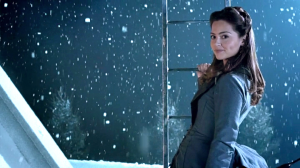 Compelling images filled this year’s special, but the one that attracted this sci-fi Christian most was the ladder. The sight of Clara jumping up to pull down rungs that lead to the sky immediately brought to mind Jacob’s dream in Genesis 28. (Well, in all honesty, Clara’s search in the park for the Doctor also reminded me of Gillian’s similar search for Admiral Kirk in Star Trek IV: The Voyage Home… but I digress.)
Compelling images filled this year’s special, but the one that attracted this sci-fi Christian most was the ladder. The sight of Clara jumping up to pull down rungs that lead to the sky immediately brought to mind Jacob’s dream in Genesis 28. (Well, in all honesty, Clara’s search in the park for the Doctor also reminded me of Gillian’s similar search for Admiral Kirk in Star Trek IV: The Voyage Home… but I digress.)
Jacob, you’ll remember, is “on the run,” having cheated his brother Esau out of both his birthright and their father Isaac’s blessing. Stopping for a night’s rest, he sleeps with only a stone for a pillow. He is a marked man, an outcast, almost out of options. And yet he dreams: “he dreamed that there was a ladder set up on the earth, the top of it reaching to heaven; and the angels of God were ascending and descending on it” (Gen. 28.12). When Jacob awakes, he makes the astonished, awe-filled declaration, “This is none other than the house of God, and this is the gate of heaven” (28.17).
Sometimes people suppose that God, like the “frozen” Doctor at this episode’s outset, remains remote and distant. If not unkind, this god is at least unwilling to get involved. Such a god either doesn’t see suffering in the world, or sees it and says, as the Doctor initially says, “It’s not my problem,” sending us on our way without even a memory worm to ease our pain! If we want this god to help, we feel it is up to us to attract his attention, perhaps even to “woo” him down to earth and into action, as Clara woos the Doctor.
But Jacob’s ladder symbolizes the truth that God, while high and holy, does not remain aloof from us, especially not in our troubles. Even though Jacob brought his troubles on himself (as so many of us so often do), God stays connected to him, granting him a breathtaking vision of renewed promise and constant presence. It’s a lovely image.
In Jesus Christ, however, the image of Jacob’s ladder becomes lovelier still. Jesus tells us that he is, himself, the ladder, the link between heaven and earth: “Very truly, I tell you, you will see heaven opened and the angels of God ascending and descending upon the Son of Man” (John 1.51).
“Love came down at Christmas,” an old hymn sings, “love all lovely, love divine.” The divine Word has become flesh; the light of life has entered our darkness, shining in unconquerable brilliance (see John 1.1,5,14). God has come down the ladder to lead us back up it with him: “I will come again and take you to myself, so that where I am, there you may be also” (John 14.3). The Doctor gives Clara a key to the TARDIS; Jesus Christ holds the keys to death and hell (see Rev. 1.18), and is our open door to life abundant and life eternal (see John 10.7,10).
And it all begins at Christmas.
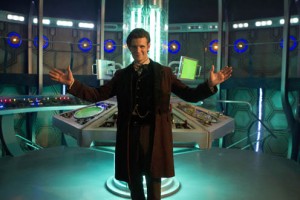 “This is the day,” the Doctor shouts when he first welcomes Clara into the TARDIS, as he is dancing around its (radically redesigned) control room; overcome with joy, he repeats the phrase, “This is the day”—and my mind supplied the next phrase: “that the Lord has made” (Ps. 118.24). The Doctor didn’t end up quoting Scripture, but his words still indirectly witness to the truth about Christmas: “This is the day everything begins!”
“This is the day,” the Doctor shouts when he first welcomes Clara into the TARDIS, as he is dancing around its (radically redesigned) control room; overcome with joy, he repeats the phrase, “This is the day”—and my mind supplied the next phrase: “that the Lord has made” (Ps. 118.24). The Doctor didn’t end up quoting Scripture, but his words still indirectly witness to the truth about Christmas: “This is the day everything begins!”
As the angels sang over Bethlehem, “[T]o you is born this day… a Savior, who is the Messiah, the Lord” (Luke 2.11, emphasis added). So let us remember it—everything about it. Let us, as the psalm-singer urges, rejoice and be glad in it—not just through the traditional twelve days of Christmastide, but in every season of the New Year ahead, throughout every year of our lives. And, like the Doctor, let us run—“let us run with perseverance the race that is set before us, looking to Jesus the pioneer and perfecter of our faith” (Heb. 12.1-2).
After all, Clara tells the Doctor to remember and run. As summaries of the Christian life go, it’s not a bad one. Remember, and run… and rejoice! God has descended the ladder. Jesus Christ is born. God is with us—Emmanuel!
Scripture quotations are from the New Revised Standard Version.

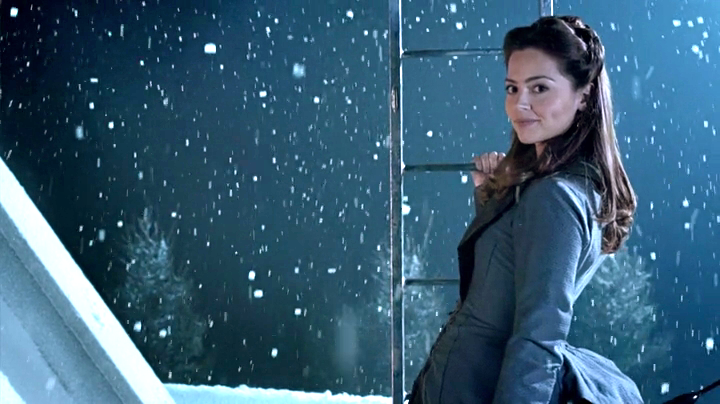
Does your hatred of snow give you special appreciation for Aslan’s return in The Lion, the Witch, and the Wardrobe?
(I love snow. I love fall and winter. It is heat I cannot abide.)
No doubt, Ben, though I’d never thought of it before. Yes, all the more reason to cheer Aslan being on the move!
I am a big fan of both fall and spring – the temperate, reasonable seasons. Neither winter nor summer win any votes from me!
See, I betrayed myself as still a relative “newbie” – here’s some info from DR WHO history on the Great Intelligence – http://tardis.wikia.com/wiki/Great_Intelligence.